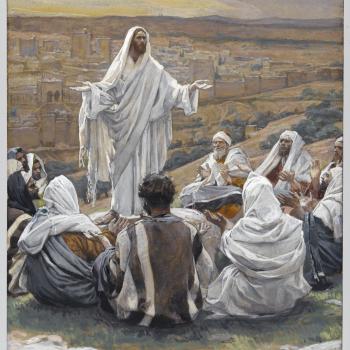 Tomorrow is Reformation Day, the day on which, 495 years ago Martin Luther posted his Facebook protest. Er, I mean, Wittenberg protest. I remember many years ago hearing a chapel talk that was supposed to be on the glories of the Reformation, but was instead a reflection in the tragedy of the Reformation. That speaker was not-so-gently chided about his point of view.
Tomorrow is Reformation Day, the day on which, 495 years ago Martin Luther posted his Facebook protest. Er, I mean, Wittenberg protest. I remember many years ago hearing a chapel talk that was supposed to be on the glories of the Reformation, but was instead a reflection in the tragedy of the Reformation. That speaker was not-so-gently chided about his point of view.
As a church historian of sorts, I’ve circled around these ideas for some time. Glories? Tragedies? Hopefully I’m not circling a drain. Nearly thirty years ago, when I became an Episcopalian, one beloved professor asked, “So you’re on the road to Rome, eh?” I’m not even sure I’ve made it to Canterbury, and I steadily fend off any proximity to 815 Second Avenue, New York (The Episcopal Church headquarters in the U.S.). So, no, Dr. Shelley, I’m not on the road to Rome.
I happily remain a Protestant.
This is no diatribe against Roman Catholicism. I’m not a happy Protestant because those Catholics are so nefarious and misinformed. I like Catholicism—its spirituality, its universality, its wild and madcap diversity; I consider myself Catholic in every ancient sense; and I would become a Roman Catholic in a heartbeat if they would simply make certain accommodations for my, shall we say, Protestant convictions. I’m not holding my breath.
So why celebrate Protestantism if I’m so enamored with Catholicism? Here are 95 reasons. No, just kidding, only the first five. Maybe not the best five reasons in the world, but my top five.
1) Scripture: first, last, always. I am fully aware of the can of worms that Martin Luther and his fellow reformers opened when they advocated the idea that every believer should have full access to the scriptures and understand its meaning for themselves. Absolutely shocking. And yes, deeply problematic in innumerable ways. In Christianity’s Dangerous Idea: The Protestant Revolution, Alister McGrath writes of it like this:
“The dangerous new idea, firmly embodied at the heart of the Protestant revolution, was that all Christians have the right to interpret the Bible for themselves. However, it ultimately proved uncontrollable, spawning developments that few at the time could have envisaged or predicted … that gave rise to an unparalleled degree of creativity and growth, on the one hand, while on the other causing new tensions and debates that, by their very nature, probably lie beyond resolution.” (2)
Crazy dangerous, and yes, divisive and sometimes even deadly. (I did read Foxe’s Book of Martyrs at a very impressionable young age, and I’ve never recovered. Why that was in our church library I will never know.)
And still, I believe that its power and beauty and meaning simply must be appropriated by the individual, not mediated. I’m not saying we can do whatever we wish with it (see #2 below), though that is of course what happened, and I do believe we should be reading and understanding it within the context of the church community over the ages, which is of course not what often happens. I was always taught the “perspicuity of scripture,” that its meaning was clear and accessible. Sometimes. Sometimes not. Yes, it’s dangerous; and yes, it’s worth the risks.
Nevertheless, for me, scripture gives the first word and always has the last word: Sola scriptura in that scripture gives all we need for the knowledge of God’s call on our lives, but prima scriptura in that scripture is enhanced and supported by a myriad of other “words”—nature, writings of the saints, witnesses through the ages, the arts, etc.
2) Tradition: the Church through the ages. Perhaps this surprises you. Number one is to be expected. Number two sounds quite Catholic. But as I said, I consider myself Catholic in all the ways that the ancient church would have recognized. And thus I cling to the Tradition of the Church, expressed most fully in the lived Tradition of worshiping Jesus Christ as Lord, and expressed particularly in the reflections and experiences of countless voices through the ages who have meditated long on the scriptures and have directed me to vistas of faith and the love of God I could never have found on my own.
There is a “Jesus story” that is at the heart of Christian life, and that story has majestically infused Church thinking and teaching about God, creation, redemption, and destiny in ways that draw us into a center of orthodoxy. And that’s where I want to be.
3) Laity: the priesthood of all believers. I don’t mean to sound too terribly anti-clerical here, but the whole “Father knows best” line sticks hard in my throat. There is a paternalism and a patriarchalism and a sexism to professional ministry (both Catholic and Protestant!!) that seems completely counterintuitive to the freedom and Spirit-driven gifting of those who are in Christ. Yes, we need order and functionality within the Church, and yes we thus need some who are appointed to certain tasks. But these my brother priests and pastors are servants of the same Grace and, like them, I am a dispenser of it as well, when and as God so works in my life.
4) Music: hymns. I like to sing, and I like all of us singing together, and I like the old Protestant hymns. They’re rich and poetic and stately, and when we all sing them together, I feel a deep connection with generations of simple, devout believers who have lived and died in quiet faith. My experiences in hymn-singing in Catholic churches have been, well, less than satisfying. And don’t get me going on chorus crooning. We’ve definitely and sadly neglected the visual arts, but we have excelled in the hymns.
5) Family: my own traditions. I am fortunate enough to come from a vital stock of godly Protestants. They are mine, and I am theirs. Some of us have been dysfunctional believers, to be sure. But we share parents and grandparents and great-grandparents, and perhaps much farther back, of solid, rooted Protestant faith. They’re my family, of origin and of faith. I treasure the shared experiences—past and present—too much to abandon them.
These are not going to satisfy you theologically, I am sure. And the remaining ninety reasons would, perhaps, be equally maddening to some of you: Marianism, the role of the saints (pray for me, Genevieve), purgatory, the “management” of the sacraments, the titles of eminence, assimilationist practices, and on and on. But like I said, this isn’t about a rejection of Roman Catholicism, but a hearty embrace of Protestantism.
At least, for today.












